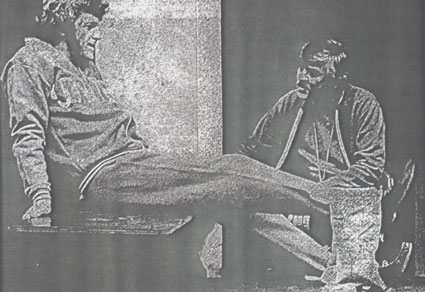
Expanding ego of a soccer star

Given the glamour which big money has
brought to the game it was only a matter of time before the
soccer star got his transfer to the theatre. This is the
main difference between Barrie Keeffe’s play and pieces like
Zigger Zagger and The Changing
Room which deal more with
crowds and teams than with the hero of the match.
At first glance, Only a Game promises a football equivalent to Golden
Boy, the story of a man
who junked his education and went after the short-term riches of sport. Into his mid-30s and recovering from a knee operation,
Murray Fearn is at the crossroads and dreading the prospect of
“division four or a pub in
Billericay”. As he waits for a specialist’s report on his chances
of playing again, the elements of his life
take shape; his failing marriage to an interior designer; the devoted scrubber
he sleeps with as a relief from his critical wife; the sycophantic
publicist; and the team
trainer who sees him as a disposable
commodity despite his
business interests and
Sunday newspaper column.
Then he slams into the specialist’s office at
dead of night, and gets a qualified
go-ahead to return to the game.
It is an efficient piece of story telling, spinning out the suspense of
the medical report and the outcome of the return match; and
giving much individual colour
as well as authenticity to minor
characters like Colin Jeavons’s
waspishly frivolous specialist,
and Ivan Beavis’s ex-RSM
trainer, doubling up in agony
after jubilantly kicking a paper
ball. The materials and observations are all there for a penetrating
study of big-business sport; but what the play is saying
remains far from clear.
The events are quite logical but Mr
Keeffe has done violence to his character to make them happen.
All Murray’s idealism is suppressed; he takes on a slimy personal
manager whom no one in his right senses would
trust;
and his father, first shown
in sympathetic contact with his celebrity son, is brought back to contribute
other damaging revelations. Jan Waters and Peter
Gilmore work with great tact to achieve the reversal of marital
sympathies but they are unable
to smother the play's crashing
changes of gear which finally
leave you in the company of
a loutish has-been who does indeed have his brains in his
boots. Whether this is the game's fault or his own is no longer
a matter of interest.
However there does remain the pleasure of some
excellent dialogue and-of one of the best cast productions which Michael Croft has yet directed at the Shaw.
Irving
Wardle
21 March 1973
Photography
by Donald Cooper
©
The Times